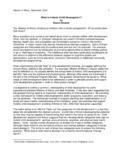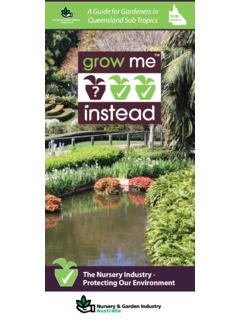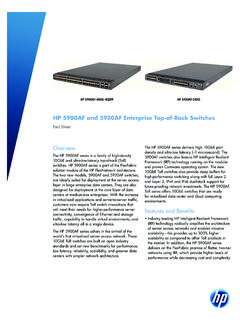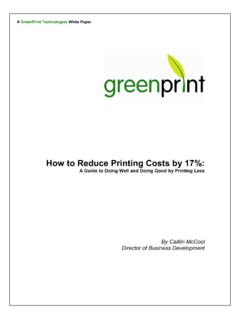Transcription of A Basis for Greener Processes and Products - UNEP
1 The document provides guidance principles for Life Cycle Assessment (LCA) databases; this includes how to collect raw data, how to develop datasets and how to manage databases. The ww www .w u .nuenpe. p o .r ogr g publication also addresses questions United United Nations Nations Environment Environment Programme Programme BoxBox 3055230552. Nairobi, Nairobi, 00100. 00100. Kenya Kenya concerning data documentation and Tel: Tel: (254(254. 20) 7621234. 20) 7621234. Fax:Fax: (254(254. 20) 7623927. 20) 7623927. review, coordination among databases, E-mail: E-mail: web:web: capacity building and future scenarios. LCA databases provide fundamental For more information, contact: Global Guidance energy, materials, land, water UNEP DTIE. consumption data and emissions data Sustainable, Consumption Principles for Life Cycle into water, air and soil for a wide range and Production Branch 15 rue de Milan of Processes , Products and materials.
2 75441 Paris CEDEX 09. In this way the publication provides the bridge between the data users and the France Tel: +33 1 4437 1450. Assessment Databases Fax: +33 1 4437 1474. data providers, making basic information E-mail: A Basis for Greener Processes easily accessible for computing the environmental footprints of materials and and Products Products that are key to make and judge green claims and to allow institutional and individual consumers to make informed consumption choices. The document is the output of the UNEP/SETAC Global Guidance for LCA Databases workshop, (30th January 4th February 2011, Shonan, Japan), also known as the Shonan Guidance Principles' workshop. United Nations Environment Programme ISBN: 978-92-807-3174-3. DTI/1410/PA. About the UNEP Division of Technology, Industry and Economics Set up in 1975, three years after UNEP was created, the Division of Technology, Economics (DTIE) provides solutions to policy-makers and helps change the business environment by offering platforms for dialogue and co-operation, innovative policy options, pilot projects and creative market mechanisms.
3 DTIE plays a leading role in three of the six UNEP strategic priorities: climate change, harmful substances and hazardous waste, resource efficiency. DTIE is also actively contributing to the Green Economy Initiative launched by UNEP in 2008. This aims to shift national and world economies on to a new path, in which jobs and output growth are driven by increased investment in green sectors, and by a switch of consumers' preferences towards environmentally friendly goods and services. Moreover, DTIE is responsible for fulfilling UNEP's mandate as an implementing agency for the Montreal Protocol Multilateral Fund and plays an executing role for a number of UNEP projects financed by the Global Environment Facility. The Office of the Director, located in Paris, coordinates activities through: > The International Environmental Technology Centre - IETC (Osaka), which implements integrated waste, water and disaster management programmes, focusing in particular on Asia.
4 Copyright United Nations Environment Programme, 2011. > Sustainable Consumption and Production (Paris), which promotes sustainable consumption and This publication may be reproduced in whole or in part and in any form for production patterns as a contribution to human development through global markets. educational or non-profit purposes without special permission from the copyright > Chemicals (Geneva), which catalyses global actions to bring about the sound management of chemicals holder, provided acknowledgement of the source is made. UNEP would appreciate receiving a copy of any publication that uses this publication as a source. and the improvement of chemical safety worldwide. > Energy (Paris and Nairobi), which fosters energy and transport policies for sustainable development and No use of this publication may be made for resale or for any other commercial encourages investment in renewable energy and energy efficiency.
5 Purpose whatsoever without prior permission in writing from the United Nations Environment Programme. > OzonAction (Paris), which supports the phase-out of ozone depleting substances in developing countries and countries with economies in transition to ensure implementation of the Montreal Protocol. > Economics and Trade (Geneva), which helps countries to integrate environmental considerations into Disclaimer economic and trade policies, and works with the finance sector to incorporate sustainable development The designations employed and the presentation of the material in this publication policies. This branch is also charged with producing green economy reports. do not imply the expression of any opinion whatsoever on the part of the United Nations Environment Programme concerning the legal status of any country, territory, city or area or of its authorities, or concerning delimitation of its frontiers DTIE works with many partners (other UN agencies and programmes, international or boundaries.)
6 Moreover, the views expressed do not necessarily represent the organizations, governments, non-governmental organizations, business, industry, the media decision or the stated policy of the United Nations Environment Programme, the European Commission, any national government or any other and the public) to raise awareness, improve the transfer of knowledge and information, foster organization participating in the International Life Cycle Initiative technological cooperation and implement international conventions and agreements. Board and the Shonan Guidance Principles' workshop. The Life Cycle Initiative complements ongoing national and UNEP. regional activities. Citing of trade names or commercial Processes does not constitute endorsement. promotes environ- mentally sound practices Information contained herein does not necessarily globally and in its own activities.
7 Reflect the policy or views of the Society of Environmental Toxicology and Chemistry (SETAC). This publication is printed on 100% For more information, recycled paper, using vegetable -based Mention of commercial or noncommercial Products and services does not imply endorsement or inks and other eco-friendly practices. see affiliation by SETAC. Our distribution policy aims to reduce UNEP's carbon footprint. Global Guidance Principles for Life Cycle Assessment Databases A Basis for Greener Processes and Products Shonan Guidance Principles'. 1. Acknowledgements Producer This Guide has been produced by the UNEP/SETAC Life Cycle Initiative Supervision and Support Guido Sonnemann (UNEP), Bruce Vigon (SETAC), Sonia Valdivia (UNEP) and Mireille Rack (UNEP). Editors Guido Sonnemann (UNEP) and Bruce Vigon (SETAC). Authors For Chapters 1-5 and 7-8 the authors are listed in the following order: Chair of Work Group, Co-Chair of Work Group, the Work Group Members (in alphabetical order) and the Liaison Member.
8 The Executive Summary has been prepared by two lead authors together with the whole leadership team listed in the following order: Chair and Co-Chair of Work Groups in numerical order and the Liaison Members in alphabetical order. Executive Summary: Bruce Vigon (SETAC), Mary Ann Curran (US EPA-ORD), Guido Sonnemann (UNEP), Hongtao Wang (Sichuan University, China), Andreas Ciroth (GreenDeltaTC), Clare Broadbent (World Steel Association), Martha Stevenson (World Wildlife Fund), Atsushi Inaba (Kogakuin University, Japan), Angeline de Beaufort (Independent Consultant), Jim Fava (Five Winds International), Laura Draucker (WRI), Mark Goedkoop (Pr Consultants), Martin Baitz (PE International AG), Rolf Frischknecht (ESU Services), Stephan Krinke (Volkswagen), Nydia Suppen (Center for Life Cycle Assessment and Sustainable Design Mexico, CADIS), Bo Weidema (Ecoinvent), Marc-Andree Wolf (EC JRC).
9 Prologue: Guido Sonnemann (UNEP). Chapters 1 & 8: Guido Sonnemann (UNEP), Bruce Vigon (SETAC), Martin Baitz (PE International AG), Rolf Frischknecht (ESU Services), Stephan Krinke (Volkswagen), Nydia Suppen (Center for Life Cycle Assessment and Sustainable Design Mexico, CADIS), Bo Weidema (Ecoinvent), Marc-Andree Wolf (EC JRC). Chapter 2: Hongtao Wang (Sichuan University, China), Andreas Ciroth (GreenDeltaTC), Pierre Gerber (FAO), Charles Mbowha (University of Johannesburg, South Africa), Thumrongrut Mungcharoen (Kasetsart University and National Metal and Materials Technology Center, Thailand), Abdelhadi Sahnoune (ExxonMobil Chemical Co.), Kiyotaka Tahara (National Institute of Advanced Industrial Science and Technology, Japan), Ladji Tikana (European Copper Institute), Nydia Suppen (Center for Life Cycle Assessment and Sustainable Design Mexico, CADIS).
10 Chapter 3: Clare Broadbent (World Steel Association), Martha Stevenson (World Wildlife Fund), Armando Caldeira-Pires (UNI Brasilia, Brazil), David Cockburn (Tetra Pak), Pascal Lesage (CIRAIG, Quebec, Canada), Ken Martchek (Alcoa Inc.), Olivier R thor (ADEME, France), Rolf Frischknecht (ESU. Services). Chapter 4: Atsushi Inaba (Kogakuin University, Japan), Angeline de Beaufort (Independent Consultant), Alberta Carpenter (NREL, US), Fredy Dinkel (Carbotech AG), Ivo Mersiowsky (DEKRA Industrial on behalf of PlasticsEurope), Claudia Pe a (Chilean Research Center of Mining and Metallurgy), Chiew Wei Puah (Malaysian Palm Oil Board), Greg Thoma (The Sustainability Consortium), Marc-Andree Wolf (EC JRC). Chapter 5: Jim Fava (Five Winds International), Laura Draucker (WRI), Greg Foliente (CSIRO, Australia), Henry King (Unilever), Joon-Jae Lee (KEITI, Korea), Toolseeram Ramjeawon (University of Mauritius), Sangwon Suh (University of California, Santa Barbara, USA), Reginald Tan (National University of Singapore), Bo Weidema (Ecoinvent).






